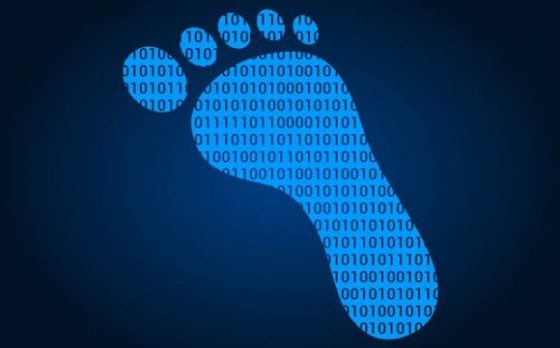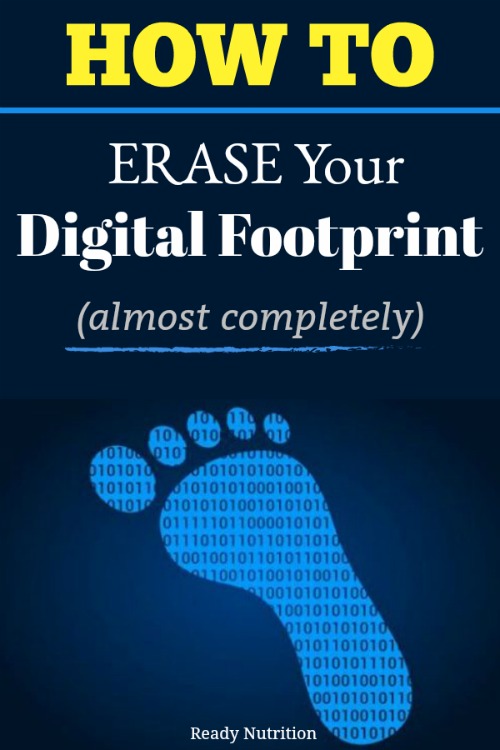
Although its almost impossible to completely wipe out your entire digital footprint as if you’ve never had access to the internet, but you can get close. If you’d like to make an attempt to completely remove yourself from the internet, we’ve got a few tips and tricks that could help you along the way.
To go the full off-the-grid route, “it’s cash, barters,” Bradley Shear, a lawyer specializing in social media told The Washington Post. “Do not use any electronic device that can lead back to your whereabouts.” Which leads us to the first item to consider.
The first thing you want to do is the hardest for some, but its the most obvious. You need to quit appearing online. Stop posting on Facebook or Twitter and no longer use search engines. All of those will track your location and Internet usage leaving behind your digital footprint. Of course, just not using the internet isn’t quite enough if you’d like yourself completely gone in full-off-the-grid fashion.
The next step would be deleting your online accounts. Every single one of them. Having a social media account is, more or less, ensuring your active participation in letting the Internet learn more about you. Facebook, in particular, knows a lot about you and is very good at tracking what you do across the rest of the Web, even when you’re not actively using it. If you need help deleting your accounts, consider JustDelete.Me, which provides tips and links to remove accounts. But you can’t just remove your accounts and expect that it’s done and over with. You will also need to remove any and all information and content that is posted about you by others. This can get a little trickier, but you could consider trying Abine’s DeleteMe, which for a fee can assist in removing your personal contact information and your photos and will provide you with a regular report and updates.
Next, you want to search for yourself on the Internet. This will help you discover if there are any old accounts (does anyone even remember MySpace?) that you may have forgotten you had just lingering around. If you happen to come across an account you cannot delete, just start falsifying the information. Change the name on the account to whatever you want it to be, that’s different than yours, obviously. Change the city and state and leave the gender “unselected” if possible. The less information you put in, the less you have to falsify.
You are also going to want to unsubscribe from all of those mailing lists you’ve accidentally signed up for during your Internet travels. That’s usually pretty easy to do. Go into your junk folder and open up the advertisements. Scroll to the bottom of the email and click the tiny word “unsubscribe.” When it directs you to, make sure you choose to no longer receive ANY email that you’d consider “junk.” Afterall, that’s why it was in that folder, to begin with anyway, right?
If you still need the Internet for work, you may have to stop here. Having removed social media and cleaning up your email will go a long way in minimizing your online trail. But for those who wish to continue on and “go dark,” your next step would be deleting search engine results. Google has a URL removal tool that could help. The next step would be contacting webmasters of websites you have no control over. Be kind, and let them know you’d like your information and comments removed. Be prepared to be told by some that all public information should remain public, in which case, you may be out of luck. You’ll also need patience. Not every single webmaster will get back to you in a timely manner.
Once you’ve completed everything listed above, you should consider removing your information from data clearinghouses. Many companies track your online behavior and sell that data to others. Intelius, Spokeo, and People Finders are a few examples of such data clearinghouses. In order to remove your information from these, however, will take up a lot of your time. You’ll need to make a lot of phone calls and fill out tons of paperwork. A paid service called DeleteMe could be considered if you’ve got some extra cash laying around. For all others, you will need time and patience and determination to get through this step.
Once you feel you’ve gotten yourself removed from data clearinghouses, you should contact the phone company and be sure to make your phone number unlisted.
The last step would be to delete your email. “Every time you access it, they have your IP address,” Shear said. This is last simply because, during the completion of the previous steps, an email address is likely going to be required at some point.
If you’ve decided you cannot completely “go dark” as far an internet use is concerned, consider protecting your data and information by using an encrypted email service such as ProtonMail. And if you want your activity not to be tracked across the Web, you would have to essentially use a virtual private network, or VPN, every time you access the Internet unless you exclusively access the Internet from public machines (such as those at a public library). For searching online, you can use sites such as DuckDuckGo instead of Google or Yahoo, or any other search engine that tracks you. Also, consider Signal, a text and phone-call encryption app that comes with a recommendation from Edward Snowden himself.
Although it seems it may be futile to attempt to “go dark,” you just might be successful. Best of luck to those who have the desire to disappear from the Internet, because you’ll need it, and all the patience you can muster.


All that using things like encrypted email does, is raise a giant red flag for the NSA and similar ilk. Just like the TOR browser and such, many of these things were created or sponsored by the CIA.
Often, the best anonymity can be had in a huge crowd. Filter yourself, and you stand out like a sore thumb.
One of the best tips- and really disgraceful that an article on this subject would not mention something so obvious: Simply do not put your real name on your computer (i.e. when setting up a new computer or OS, and it says “enter name”) nor use it in your email address, or “from” field, etc. That alone will increase your privacy wonderfully.
I’ve been on the net for 20 years now- and as I’ve always been zealous of my privacy, I’ve never used my name in my email; on my computer; Never did social media (it’s for morons); and use a secure Linux operating system….and I’ve been quite happy with the level of privacy I’ve been able to maintain.
Good on you “Jay”. I’d like to suggest that a good VPN offers a level of crowd anonymity of internet activity that is a huge step above raw internet access via ISP alone. Check out ProtonMail. Free ProtonVPN is always helpful if one has to use internet access in mobile situations. Keep up the good work sir !
Couldn’t a person just play dead by not using the Internet at all for anything? Luddite the thing away!
LOL I guess bleach bit and a BFH isn’t the answer.
Good article to further understanding of on-line privacy issues. But some profound ironies though: (a) 11 internet trackers track all whom alight on this website page. So Google, Amazon and 9 other trackers know of your interaction activities here. (b)There is no session privacy too. All the data that goes between you the reader an this site is unencrypted. There is NO excuse for that failure. Encryption is freely available for the site owner to use. ISPs use this data for their own purposes, thereby violating your privacy.(c) This comment capability is offered by the site owner using Disqus. Read their Terms and Privacy polices… more ironies abound.
ProtonMail and ProtonVPN offers free mail and vpn service.They are Swiss and do not fall under US, EU, and 5Eyes governance. There is no escape from surveilance but picking thoughtfully can lower your profile.
Thank you, B.E.
I will definitely look into VPN, and likely start using one. I appreciate the info from your other post, too- about ProtonMail being Swiss- which I did not know. While I personally don’t feel the need for encrypted email, it’s nice to know that there is a viable service out should the need arise.
What are your thoughts on encryption at the OS level? I’m going to be installing a new OS soon, and like most Linux distros, it offers the option of setting it up as an encrypted system. Personally, I really don’t feel the need for that level of security, as there’s really nothing “sensitive” on my ‘puter….but perhaps I’m overlooking something?
You’re welcome Jay.
I hear your question regarding encryption at the OS or disk level. I too go back and forth on that security as well. The risk/benefit calculation would be wise to take into account: (a) mobility: is this computer going outside and you have information therein being sensitive and vulnerable? I’d explore well architected encryption at the OS, disk volume, or file/folder level. That dovetails to (b): data backup and disaster recovery. If you encrypt how will it impact your recovery from a catastrophic hardware or software event? Loss of information happens many ways, including lost encryption infrastructures.
Reading your post says you’ve thought about such protections.. again good on you ! Try and play out, if you can on an old computer, how such protections work and recover in your situation. Then you’ll have more real knowledge on this important issue.
The search engines Duck Duck Go and StartPage do not allow tracking.
On the negative side. You can delete FB and every other media page you want, but the info is stored at the nsa forever. If you’ve been on the web one time, you are in forever. It’s kind of like selling your soul to the devil.
Actually, I think that spending a lot of time trying to be invisible is counterproductive in terms of disaster preparedness, and in getting disaster notifications. Limiting the kinds of information you publicly share about yourself is certainly practical and sensible on a day to day basis, like not telling the world you are leaving for vacation. But considering how many data breaches have already occurred, all ‘my’ personal data has been divulged by corporations and agencies that have been been hacked. I could cut myself off from the www but my ‘personal information’ is already irretrievable. The digital profiles that corporations have built from tracking my www use, my buying patterns, my search patterns, aren’t going to vanish even if I stop using a computer, phone, and pay cash for everything. I aim for low profile, not invisibility.